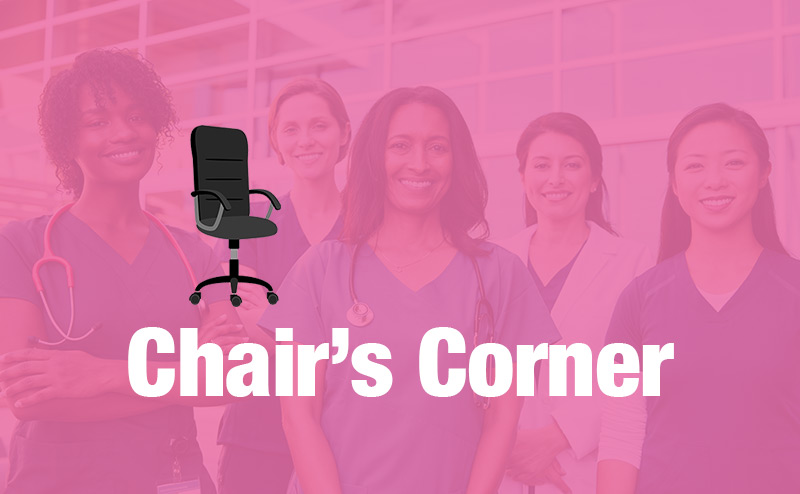
Chair’s Corner: Fractures
As women Emergency Medicine physicians, we are all familiar with fractures and emergent fracture management. We easily recall the various means of fracture healing: immobilization, osteoblast activity, and a tincture of time sums it up at a rudimentary level. But the fractures I am considering are not of our bones, or even of our hard structures - they are the fractures of our relationships. Where are the osteoblasts for repair of our relationship with our sister or our best friend? What does immobilization have to do with healing the fractures of our relationship with Emergency Medicine? Do our fractured relationships heal? How?
It was the day we were celebrating my birthday, and we were getting ready to sit down for a tasty dinner of pork chops on the grill and kale from our garden. It was looking and smelling great at our dining room table. My husband and daughters were seated, and my 11-year-old son was coming around the table. He had an attitude. He had a poor attitude. His attitude stemmed from an interaction before church that morning. He was angry at his parents for telling him to put pants on rather than shorts and to drink milk rather than apple juice. Oh, the trials of our children, so very confusing from a parent’s perspective. I am certain my childhood trials, anger and tears perplexed my parents too. We talked at the dinner table of how the juice has been removed from our home due to our son’s inability to get over not drinking a glass of juice this morning. His sisters, like hungry sharks smelling blood in the water, tease him about how he lost juice for all of them. This infuriated him more, but not as much as when I asked why he is still upset over something as small as a glass of juice. His face reddens and he takes a deep breath. My husband saw his persistent anger and asked also, “Why are you acting this way? Why are you so upset?” Our son stood up from the table, red-faced and with tears running down his cheeks, “I just am! I DON’T KNOW!” After his shouting and bursting of tears, he fell back into his chair and put his head down on his arms on our dinner table. He sat there crying and sobbing as my husband and I shared a brief eye contact communicating, “What is going on here?!” We settled into our chairs and took a deep breath ourselves. My husband took the lead and calmly asked our son what was going on. Our son, defiant and angry, shouted back that he did not want to talk about it. He got up and wanted to walk away, we directed him back to his chair. My husband and I both knew we needed to get to the bottom of this and help our son through his difficult time and whatever issue was eating at his heart. After several minutes of sitting and working through his anger, my son shared what was really bothering him, “I wish you NEVER came into my life!” he shouted at me.
There it was. A micro-fracture. I knew it was going to be something hurtful, seeing as he tried to avoid saying it. He tried to hold it inside. But we knew he had to get it out and that we as his parents had to help him overcome this. Thankfully, my husband and I were both emotionally in control and focused solely on the well-being and development of our son. We talked through things and eventually came out on the other side together and as a family. We helped our son work through his emotions and anger, and in doing that, we helped ourselves heal as well. His words and actions were a micro-fracture in our relationships as a family, and specifically the relationship between mother and son. I consider it more a stress injury or stress fracture rather than a comminuted, open, and displaced fracture. No need for antibiotics and surgical washout. Instead, let’s offload the injury and give it time to heal. Time. After some reflection from myself and a few more conversations with my son, we are healed and like fractured bones, we grew back even stronger than before. It feels good.
But, what about our fractured relationship with that angry patient in room 4? He was so upset with the delayed labs. He got angry, he swore and yelled at you and the nurse. Then he left without his treatment being completed. While that clearly did not ruin your whole shift, did it cause a stress injury? Did you worry about him as your shift wrapped up? Did you think about that incident the next shift the lab was delayed?
Thinking larger, what about our fractured relationship with Emergency Medicine? We as women are leaving EM at much higher rates compared to men. Why? What were the events that led to the fractures? Was it a series of micro-fractures? Was it the emotional and physical demands of the pandemic? We all worked extra shifts, in an uncertain environment, with less and less staff. We were all isolated from each other either by masks, face shields, video screens and windows. Yet, we all served as the bedrock for our society during some of the toughest times for our generation. We all stayed calm and provided comfort and even hope for our patients despite our occult concerns for our families, our health and our well-being. You all did wonderful, by the way! I am proud that we as EM physicians were there for our society during the crisis. Great job team! But our relationship with EM seems to have suffered or fractured.
Are we fractured in our relationship with Emergency Medicine due to the residual decline in perceived value from society as the pandemic wanes and life continues at the new normal? We are all seemingly expected to do more with less. Maybe all the smaller things eventually lead to a completed stress fracture? We ran as far as we could and now, we cannot even tolerate walking. Maybe we had one major crash that caused a nasty, displaced, and contaminated open fracture that needs emergent washout? Was it that patient with the family member who you had such a hard time consoling? Was it that woman who reminded you of your sister? Or was it the little girl who reminded you of your daughter who came in after that terrible MVC?
Maybe we will never be able to pinpoint what caused a fracture in our relationship with EM, but we do know that with the right care, fractures can heal. We know offloading and stabilizing or immobilizing a fracture allows the body to repair the wounded bone, and maybe it even comes back stronger! I ask you to think of what you can do to off-load and stabilize and hold your fractured relationships. Maybe it is a much needed and earned vacation to a tropical paradise. Maybe it is starting the popular side-hustle to reinvent your career. Maybe it is something in your department, take on that committee chair position or apply for that director position. Maybe it is contributing a piece to your AAWEP newsletter and sharing your experiences to help both yourself and others. Maybe we need to take a breath, refocus, and find the joys in our patient and staff interactions, in the amazing things we do each shift to impact others. Maybe, we just need time.
Alecia Gende, DO, CAQSM, FACEP
AAWEP Chair
Mayo Clinic Health System
La Crosse, WI



